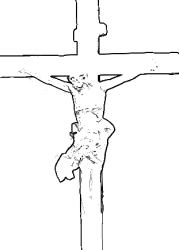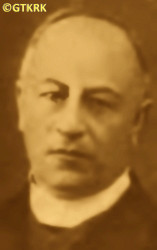Roman Catholic
St Sigismund parish
05-507 Słomczyn
85 Wiślana Str.
Konstancin deanery
Warsaw archdiocese, Poland
full list:
displayClick to display full list

searchClick to search full list by categories
wyświetlKliknij by wyświetlić pełną listę po polsku

szukajKliknij by przeszukać listę wg kategorii po polsku

Martyrology of the clergy — Poland
XX century (1914 – 1989)
personal data
surname
SIUDZIŃSKI
forename(s)
Anthony Steven (pl. Antoni Stefan)

function
diocesan priest
creed
Latin (Roman Catholic) Church RCmore on
en.wikipedia.org
[access: 2014.09.21]
diocese / province
Gniezno and Poznań archdiocese (aeque principaliter)more on
www.archpoznan.pl
[access: 2012.11.23]
date and place
of death
05.09.1939

Niestronnotoday: Mogilno gm., Mogilno pov., Kuyavia‐Pomerania voiv., Poland
more on
en.wikipedia.org
[access: 2021.07.18]
details of death
Perished few days after German invasion on 01.09.1939 of Poland (Russians invaded Poland 17 days later) and start of the World War II, during war campaign — nearby Mogilno was bombarded by Germans on 03.09.1939 (Germans targeted Savings Bank for Sick) and next on 05.09.1939, and finally captured on 11.09.1939.
perpetrators
Germans
sites and events
Ribbentrop‐MolotovClick to display the description, Pius XI's encyclicalsClick to display the description
date and place
of birth
18.05.1875Birth certification on:
www.familysearch.org
[access: 2025.04.13]

Gniewkowotoday: Gniewkowo gm., Inowrocław pov., Kuyavia‐Pomerania voiv., Poland
more on
en.wikipedia.org
[access: 2020.11.27]
parents
SIUDZIŃSKI Joseph
🞲 ?, ? — 🕆 ?, ?

BUGALSKA Marianne
🞲 ?, ? — 🕆 ?, ?
baptism
24.05.1875Birth certification on:
www.familysearch.org
[access: 2025.04.13]

Gniewkowotoday: Gniewkowo gm., Inowrocław pov., Kuyavia‐Pomerania voiv., Poland
more on
en.wikipedia.org
[access: 2020.11.27]
St Nicholas the Bishop and Confessor amd St Constance RC church
presbyter (holy orders)
ordination
25.11.1900

Gnieznotoday: Gniezno urban gm., Gniezno pov., Greater Poland voiv., Poland
more on
en.wikipedia.org
[access: 2021.12.18]
positions held
1911 – 1939
parish priest — Niestronnotoday: Mogilno gm., Mogilno pov., Kuyavia‐Pomerania voiv., Poland
more on
en.wikipedia.org
[access: 2021.07.18] ⋄ St Michael the Archangel RC parish ⋄ Rogowotoday: Rogowo gm., Żnin pov., Kuyavia‐Pomerania voiv., Poland
more on
en.wikipedia.org
[access: 2021.07.18] RC deanery
1928 – 1929
administrator — Ryszewkotoday: Gąsawa gm., Żnin pov., Kuyavia‐Pomerania voiv., Poland
more on
en.wikipedia.org
[access: 2021.07.18] ⋄ St Mary Magdalene RC parish ⋄ Rogowotoday: Rogowo gm., Żnin pov., Kuyavia‐Pomerania voiv., Poland
more on
en.wikipedia.org
[access: 2021.07.18] RC deanery — acting („ad interim”)
1919
administrator — Ryszewkotoday: Gąsawa gm., Żnin pov., Kuyavia‐Pomerania voiv., Poland
more on
en.wikipedia.org
[access: 2021.07.18] ⋄ St Mary Magdalene RC parish ⋄ Rogowotoday: Rogowo gm., Żnin pov., Kuyavia‐Pomerania voiv., Poland
more on
en.wikipedia.org
[access: 2021.07.18] RC deanery — acting („ad interim”)
1911 – 1919
parish priest — Palędzie Kościelnetoday: Mogilno gm., Mogilno pov., Kuyavia‐Pomerania voiv., Poland
more on
en.wikipedia.org
[access: 2021.07.18] ⋄ St Martin the Bishop and Confessor and St Stanislav the Bishop and Martyr RC parish ⋄ Rogowotoday: Rogowo gm., Żnin pov., Kuyavia‐Pomerania voiv., Poland
more on
en.wikipedia.org
[access: 2021.07.18] RC deanery
1909 – 1911
administrator — Niestronnotoday: Mogilno gm., Mogilno pov., Kuyavia‐Pomerania voiv., Poland
more on
en.wikipedia.org
[access: 2021.07.18] ⋄ St Michael the Archangel RC parish ⋄ Rogowotoday: Rogowo gm., Żnin pov., Kuyavia‐Pomerania voiv., Poland
more on
en.wikipedia.org
[access: 2021.07.18] RC deanery
1909 – 1911
administrator — Palędzie Kościelnetoday: Mogilno gm., Mogilno pov., Kuyavia‐Pomerania voiv., Poland
more on
en.wikipedia.org
[access: 2021.07.18] ⋄ St Martin the Bishop and Confessor and St Stanislav the Bishop and Martyr RC parish ⋄ Rogowotoday: Rogowo gm., Żnin pov., Kuyavia‐Pomerania voiv., Poland
more on
en.wikipedia.org
[access: 2021.07.18] RC deanery
1905 – 1909
vicar — Gnieznotoday: Gniezno urban gm., Gniezno pov., Greater Poland voiv., Poland
more on
en.wikipedia.org
[access: 2021.12.18] ⋄ Assumption of the Blessed Virgin Mary RC archcathedral parish ⋄ Gniezno Holy Trinitydeanery name
today: Gniezno urban gm., Gniezno pov., Greater Poland voiv., Poland
more on
en.wikipedia.org
[access: 2021.12.18] RC deanery
1904
vicar — Gnieznotoday: Gniezno urban gm., Gniezno pov., Greater Poland voiv., Poland
more on
en.wikipedia.org
[access: 2021.12.18] ⋄ Assumption of the Blessed Virgin Mary RC archcathedral parish ⋄ Gniezno Holy Trinitydeanery name
today: Gniezno urban gm., Gniezno pov., Greater Poland voiv., Poland
more on
en.wikipedia.org
[access: 2021.12.18] RC deanery
1904
archivist — Gnieznotoday: Gniezno urban gm., Gniezno pov., Greater Poland voiv., Poland
more on
en.wikipedia.org
[access: 2021.12.18] ⋄ Consistory (i.e. Curia)
1900 – 1903
vicar — PoznańJeżyce neighborhood
today: Poznań city pov., Greater Poland voiv., Poland
more on
en.wikipedia.org
[access: 2021.07.18] ⋄ Sacred Heart of Jesus and St Florian RC parish ⋄ Poznańtoday: Poznań city pov., Greater Poland voiv., Poland
more on
en.wikipedia.org
[access: 2021.07.18] RC deanery
till 1900
student — Gnieznotoday: Gniezno urban gm., Gniezno pov., Greater Poland voiv., Poland
more on
en.wikipedia.org
[access: 2021.12.18] ⋄ philosophy and theology, Archbishop's Practical Theological Seminary (Lat. Seminarium Clericorum Practicum)
student — Poznańtoday: Poznań city pov., Greater Poland voiv., Poland
more on
en.wikipedia.org
[access: 2021.07.18] ⋄ philosophy and theology, Archbishop's Theological Seminary (Collegium Leoninum)
sites and events
descriptions
Ribbentrop‐Molotov: Genocidal Russian‐German alliance pact between Russian leader Joseph Stalin and German leader Adolf Hitler signed on 23.08.1939 in Moscow by respective foreign ministers, Mr. Vyacheslav Molotov for Russia and Joachim von Ribbentrop for Germany. The pact sanctioned and was the direct cause of joint Russian and German invasion of Poland and the outbreak of the World War II in 09.1939. In a political sense, the pact was an attempt to restore the status quo ante before 1914, with one exception, namely the „commercial” exchange of the so‐called „Kingdom of Poland”, which in 1914 was part of the Russian Empire, fore Eastern Galicia (today's western Ukraine), in 1914 belonging to the Austro‐Hungarian Empire. Galicia, including Lviv, was to be taken over by the Russians, the „Kingdom of Poland” — under the name of the General Governorate — Germany. The resultant „war was one of the greatest calamities and dramas of humanity in history, for two atheistic and anti‐Christian ideologies — national and international socialism — rejected God and His fifth Decalogue commandment: Thou shall not kill!” (Abp Stanislav Gądecki, 01.09.2019). The decisions taken — backed up by the betrayal of the formal allies of Poland, France and Germany, which on 12.09.1939, at a joint conference in Abbeville, decided not to provide aid to attacked Poland and not to take military action against Germany (a clear breach of treaty obligations with Poland) — were on 28.09.1939 slightly altered and made more precise when a treaty on „German‐Russian boundaries and friendship” was agreed by the same murderous signatories. One of its findings was establishment of spheres of influence in Central and Eastern Europe and in consequence IV partition of Poland. In one of its secret annexes agreed, that: „the Signatories will not tolerate on its respective territories any Polish propaganda that affects the territory of the other Side. On their respective territories they will suppress all such propaganda and inform each other of the measures taken to accomplish it”. The agreements resulted in a series of meeting between two genocidal organization representing both sides — German Gestapo and Russian NKVD when coordination of efforts to exterminate Polish intelligentsia and Polish leading classes (in Germany called «Intelligenzaktion», in Russia took the form of Katyń massacres) where discussed. Resulted in deaths of hundreds of thousands of Polish intelligentsia, including thousands of priests presented here, and tens of millions of ordinary people,. The results of this Russian‐German pact lasted till 1989 and are still in evidence even today. (more on: en.wikipedia.orgClick to attempt to display webpage
[access: 2015.09.30])
Pius XI's encyclicals: Facing the creation of two totalitarian systems in Europe, which seemed to compete with each other, though there were more similarities than contradictions between them, Pope Pius XI issued in 03.1937 (within 5 days) two encyclicals. In the „Mit brennender Sorge” (Eng. „With Burning Concern”) published on 14.03.1938, condemned the national socialism prevailing in Germany. The Pope wrote: „Whoever, following the old Germanic‐pre‐Christian beliefs, puts various impersonal fate in the place of a personal God, denies the wisdom of God and Providence […], whoever exalts earthly values: race or nation, or state, or state system, representatives of state power or other fundamental values of human society, […] and makes them the highest standard of all values, including religious ones, and idolizes them, this one […] is far from true faith in God and from a worldview corresponding to such faith”. On 19.03.1937, published „Divini Redemptoris” (Eng. „Divine Redeemer”), in which criticized Russian communism, dialectical materialism and the class struggle theory. The Pope wrote: „Communism deprives man of freedom, and therefore the spiritual basis of all life norms. It deprives the human person of all his dignity and any moral support with which he could resist the onslaught of blind passions […] This is the new gospel that Bolshevik and godless communism preaches as a message of salvation and redemption of humanity”… Pius XI demanded that the established human law be subjected to the natural law of God , recommended the implementation of the ideal of a Christian state and society, and called on Catholics to resist. Two years later, National Socialist Germany and Communist Russia came together and started World War II. (more on: www.vatican.vaClick to attempt to display webpage
[access: 2023.05.28], www.vatican.vaClick to attempt to display webpage
[access: 2023.05.28])
sources
personal:
www.wtg-gniazdo.orgClick to attempt to display webpage
[access: 2013.08.10], www.archiwum.archidiecezja.plClick to attempt to display webpage
[access: 2013.08.10], www.familysearch.orgClick to attempt to display webpage
[access: 2025.04.13]
original images:
www.wbc.poznan.plClick to attempt to display webpage
[access: 2021.05.06]
LETTER to CUSTODIAN/ADMINISTRATOR
If you have an Email client on your communicator/computer — such as Mozilla Thunderbird, Windows Mail or Microsoft Outlook, described at WikipediaPatrz:
en.wikipedia.org, among others — try the link below, please:
LETTER to CUSTODIAN/ADMINISTRATORClick and try to call your own Email client
If however you do not run such a client or the above link is not active please send an email to the Custodian/Administrator using your account — in your customary email/correspondence engine — at the following address:

giving the following as the subject:
MARTYROLOGY: SIUDZIŃSKI Anthony Steven
To return to the biography press below:
 Click to return to biography
Click to return to biography








